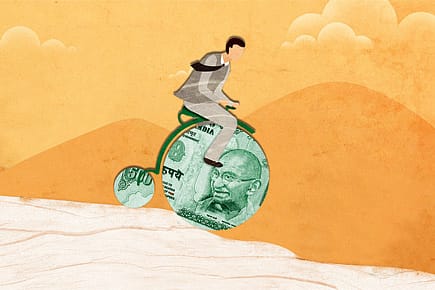The Cost of Happiness

HOW MUCH IS ENOUGH? For the last several decades, India has witnessed a liberalisation in its economic domain, which has allowed people to become entrepreneurs, owners of unicorns. Conspicuous consumption has become the order of the day. And we’ve slowly migrated from a society that was very nervous about wealth, and more so about its display. But today, none of that affects most Indians.
You see that in the way people travel, in the way people dine out, the manner in which they dress up. Have we, in this rush towards making money, actually sacrificed some basic tenets that defined India and our civilisational legacy?
Have we given up on scholarship? Have we given up on the merits of a college degree? Have we given up on societal comforts and respect? Are we taking more care of our elders? Are we moving out into nuclear families to prove a point that we have economically arrived? And these aren’t simple questions. These are questions that will redefine the India of tomorrow, if they aren’t already redefining the India of today.
It is not my place to judge whether this is good or bad; rather, the real question is how much we are willing to sacrifice at the altar of avarice, and how far we are prepared to go to satisfy our greed. You can never be too rich or too thin—there is always a desire for more. But then, do you want money, or do you want happiness? That is the existential question.
Openomics 2026: Continuity and Conviction
06 Feb 2026 - Vol 04 | Issue 57
The performance state at its peak
The question is are you willing to sacrifice everything you hold dear, from family to values, to scholarship, to knowledge just because you want to make money? And in some strange way, we’ve begun to respect that. We’ve begun to respect millionaires and billionaires. We’ve begun to look up to people who’ve made money. We’ve begun to look up to people who own vast swathes of land or, for that matter, luxury cars or private jets.
And that is my worry. My worry is that the aspirations of India today are not going to be met only through the money that India makes. It has to be far more substantive and far more real. It has to be moored and anchored in something that we hold greater in respect than just money.
I’ve often asked people how much money they would need to be happy, and the responses I receive suggest there is no limit— people believe there is always more money to be made.
And they confuse limitless money with limitless happiness, but that is never going to be the case. You will, at some stage or the other, sacrifice work-life balance. You will, at some stage or the other, sacrifice family first. You will, at some stage or the other, sacrifice nationalism and national priorities, because what is going to be important is the individual and the money that you make.
And that is not something that we, as a society, can afford, especially when we are riddled with the kind of inequality we have.
Today, if you look around and see for yourself, the Deepavali parties or the Deepavali evenings, which were meant to be evenings where you were surrounded by family, have become vulgar displays of wealth, where people are playing cards and playing with money, where the waiting staff can barely afford to live with decent means and with dignity.
Many of our brethren have been denied the opportunity of a great education, which is a fundamental right. More and more people are denied the opportunity of primary health, which again, is a fundamental right. And this is what we should be concerned about.
We have forgotten the art of subtlety. We have forgotten the art of whispering wealth.
I remain hopeful that, one day, our country will return to those values.
